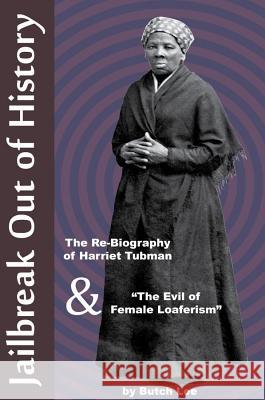Jailbreak Out of History » książka
Jailbreak Out of History
ISBN-13: 9781894946704 / Angielski / Miękka / 2021 / 169 str.
In Jailbreak Out of History, revolutionary Amazon theorist Butch Lee shows how the anticolonial struggles of New Afrikan/Black women were central to the unfolding of 19th century amerika, both during and "after" slavery.
The book's title essay, "The Re-Biography of Harriet Tubman," recounts the life and politics of Harriet Tubman, who waged and eventually led the war against the capitalist slave system. As Lee explains, "Harriet Tubman was a radical political figure, someone totally involved as a player in the great political ideas and military storms of her day. She was a guerrilla. Someone who lived and taught others to live by the communal and working-class New Afrikan culture that her people had planted in this difficult ground, and a Black Feminist to the end."
At the same time, Lee exposes how the white supremacist patriarchy has distorted the truth of Harriet's life, by both trivializing and exceptionalizing her. Countering this disinformation, "The Re-Biography of Harriet Tubman" surveys the reality of struggle before and during the u.s. Civil War, showing how New Afrikan women were repeatedly taking up the task of smashing the slave system that confined them, on their own terms. Lee shows how what was special about Harriet was not that she was unique in resisting, but rather because of her military skill--"She was one of the most brilliant professional practitioners ever at the art of war. As a guerrilla, so elusive that she could strike fatal blows and never be felt. Lead battles and go unseen. As an Amazon, she conducted warfare in a zone beyond men's comprehension. But her blows still fell on point." Jailbreak Out of History's second essay, written in 2014, picks up the story where The Re-Biography leaves off, showing how New Afrikan women's labor and resistance remained central to how the global class struggle played out in the united states after the white men's Civil War came to an end. "The Evil of Female Loaferism" details New Afrikan women's attempts to withdraw from and evade capitalist colonialism, an unofficial but massive labor strike that threw the capitalists North and South into a panic. The ruling class response consisted of the "Black Codes," Jim Crow, re-enslavement through prison labor, mass violence, and ... the establishment of a neo-colonial Black patriarchy, whose task was to make New Afrikan women subordinate to New Afrikan men just as New Afrika was supposed to be subordinate to white amerika.
"During the Civil War and after 1865, New Afrikan women led a limited strategy of rebellion both spontaneous and conscious. Away from patriarchal capitalism and its attempts to re-enslave them. Living their communal culture created for survival during captivity. Mass withholding of their labor from plantations, insistence on their right to reject fulltime wage labor, fighting to regain control over their bodies in production and reproduction both, New Afrikan women in particular cracked the old plantation system. For without the mass labor gangs the old plantation system couldn't work. The compromise they forced on the planter capitalists, even within the larger setback for liberation during the fall of Black Reconstruction, was the semi-feudal sharecropping system. Where families tilled fields and raised their children without white overseers although under the onerous class conditions of a defeated communal nation...
"New Afrikan women's strategy back then grew spontaneously out of their daily lives, their experiences and needs. Not out of some textbook or some political protest routine. Stubbornly living communal culture and fighting capitalism is often ignored or dismissed as "impractical." Yet and again, it was that partial strategy by women back then that proved most useful in real life. Still, it did not make that very difficult hurdle from the level of spontaneous breakout to the level of conscious strategy. In which analysis, tentative strategic understanding, new tactics & practice, criticism of results, and then the emergence of new strategy, all flow in a continuous dialectical circle of struggle. And those partial women's struggles & victories, great as they were, underline the reality that if you don't have a strategy to end a war then someone else will usually end it for you. But you won't like it.
"All these earlier battles throughout the New Afrikan nation still throw light for us on the latest battlefield. And on battles certain to come."











